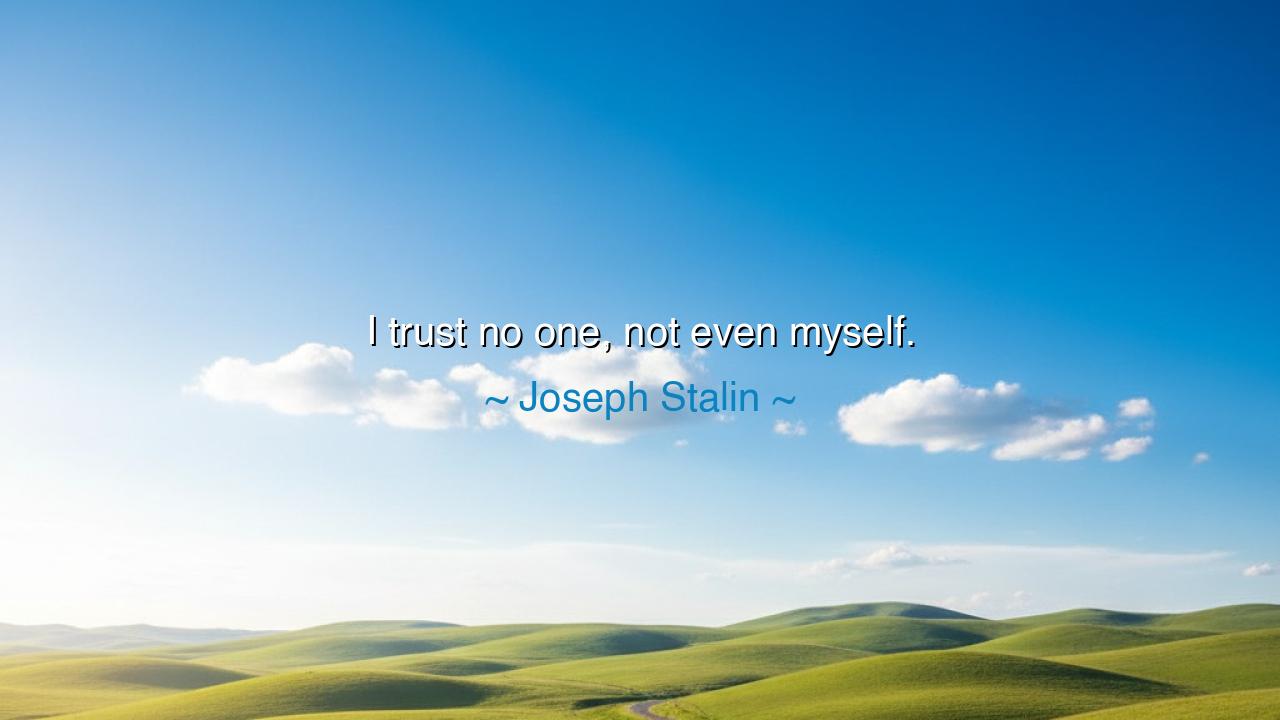
I trust no one, not even myself.






The words of Joseph Stalin—“I trust no one, not even myself.”—echo with the cold weight of suspicion, the cry of a man who walked in the halls of power where shadows whispered and daggers gleamed. To some, these words reveal paranoia; to others, they unveil a darker wisdom born of absolute rule and endless conflict. For trust, once broken, is like a shattered mirror—it reflects nothing whole again. And in the crucible of power, where betrayal is as common as breath, Stalin proclaimed that even the self could not be trusted.
The ancients knew the fragility of trust. In kingdoms and empires, men fell not always by the sword of the enemy, but by the hand of the friend. Caesar crossed the Rubicon with the loyalty of soldiers, yet it was not barbarians who slew him, but senators he had called allies—among them Brutus, whom he loved as a son. Thus has history often confirmed Stalin’s grim truth: to rise high is to be surrounded by treachery, to lean on another is to invite the blade between the ribs.
Yet Stalin’s words carry a deeper, more haunting revelation. When he said, “not even myself,” he admitted the frailty of the human heart. For within every man lies a war between desire and discipline, fear and courage, ambition and restraint. To distrust others is common; to distrust oneself is rare and tragic. It suggests a man so consumed by suspicion that even his own thoughts, his own impulses, were enemies to be watched. In this, we glimpse both wisdom and torment—the wisdom of vigilance, but the torment of never knowing rest.
History bears witness to this torment. Stalin ruled with an iron hand, purging allies and enemies alike, always fearing betrayal, always questioning loyalty. He crushed opposition, yet his mistrust devoured him from within. Though he commanded armies and ruled an empire, he lived in a fortress of doubt. His reign, forged in fear, reminds us of the truth: to live without trust is to live without peace. For what victory is it to conquer nations if one cannot even trust one’s own heart?
And yet, hidden within his grim words is a lesson of sobriety. For while absolute mistrust destroys, blind trust destroys as well. Many have been ruined by placing faith too easily in deceivers, by trusting voices that spoke honey but hid poison. The wise path lies between the extremes: to cultivate discernment, to test the heart of others, and to examine one’s own motives with ruthless honesty. To question yourself is not weakness, but strength—if it leads to self-mastery rather than despair.
The teaching, then, for those who inherit these words, is this: guard your trust as you would guard treasure. Do not scatter it like seed upon barren ground, nor lock it so tightly that no one may ever share it. Learn to test others by their deeds, not their words, and test yourself by the same measure. Ask: do my actions align with my principles? Do I live in truth, or do I deceive even myself? In this balance lies wisdom, and in wisdom lies strength.
Practically, this means living with vigilance but not paranoia. Build relationships slowly, letting trust grow from proven loyalty. Hold yourself accountable, seeking not only your own judgment but the counsel of the wise. Write down your intentions and compare them with your deeds, so that you cannot hide from yourself. In this way, you will avoid the fate of the tyrant who trusted no one, yet also avoid the folly of the naive who trust all.
So let Stalin’s dark words serve as a mirror, not as a chain: “I trust no one, not even myself.” Learn from the ruin that such total suspicion brings, but also from the kernel of truth within it—that trust must be earned, and the self must be watched. In this balance, you may find the path of peace: trusting wisely, guarding carefully, and ruling first and foremost the unruly kingdom within your own heart.






AAdministratorAdministrator
Welcome, honored guests. Please leave a comment, we will respond soon